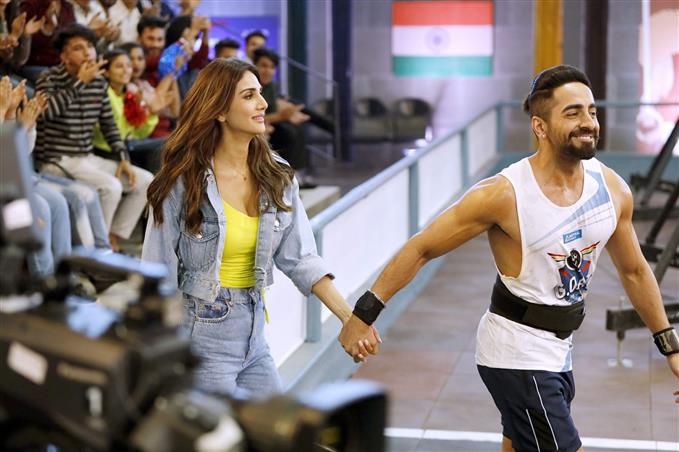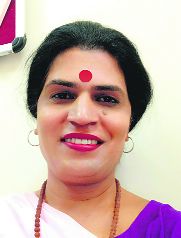Transformative: How 'Chandigarh Kare Aashiqui' is breaking the transgender stereotype
Chandigarh Kare Aashiqui is like any other Bollywood film, and then it is not. Its breaking-the-stereotype take on the life and struggles of the transgender, and the positive response, marks a bold step forward. Or does it?
Renu Sud Sinha
Simran Sahni (46) has been in the profession of creating stories for more than two decades. As a creative director with some of India’s top ad agencies, Sahni has sold ideas and products with a fair degree of success. She has finally written her most powerful story that the whole of India is talking about. It is the story of her own life and trending big time on Netflix — ‘Chandigarh Kare Aashiqui’. Mother to two trans-girls, Sahni weaved her personal account into a powerful narrative some five years back and started pitching it to various filmmakers. None came on board, their squirming affirming loud and clear that India wasn’t ready yet.



‘It’s a lone fight’
My being ‘different’ did not go down well with my neighbours. Some of them created so many obstacles that many parents stopped sending their children to my school. Hardly 30 remained, and then came the lockdown. Now, there are no means of survival.

But Sahni did not give up, and finally Abhishek (Gattu) Kapoor agreed. “For two years, I worked on the story with two other writers, Supratik Sen and Tushar Paranjape. Only when we were writing the script did I tell Gattu that it was my personal story. He was like, ‘Why didn’t you tell me before?’ The transitions were still happening in my daughters’ lives.”
Her story has found resonance with those living this life. Delhi-based Shaine Soni (30), Miss Transqueen India 2020, totally relates to the movie and its heroine Maanvi’s character, for it could well be the story of her life. “Denied acceptance, I was 17 when I moved out of my parents’ house. I met others like me and felt an immediate sense of belonging with the community because of our similar struggles,” says Shaine.


‘Did all On my own’
From my transition journey to reassigning surgeries to starting my label, I did everything on my own or with help of friends, usually keeping quiet about my being a transgender. It was in 2018 that my parents first saw me as a woman at a beauty pageant..

A student at NIFT, her parents agreed to pay only her fees. Thereafter, the struggle was hers. “From my transition journey to reassigning surgeries to starting my label, I did it all on my own or with help of friends, usually keeping quiet about my being a transgender.”
It was in 2018 that her parents saw her as a woman for the first time. “I had invited them for a Mrs India event, where I was one of the organisers. Many contestants crowded around them and told them ‘we wish we were as beautiful as your daughter’. That was the first time my father proudly owned me, and said: ‘Mere upar gayi hai (She takes after me)’,” says an emotional Shaine. As she prepares to represent India at the Miss International Trans in Panama in June, she is glad that the film has started a conversation, because a conversation is what she could never have with her parents.


‘Reinforcing stereotypes’
Sometimes even welfare bodies working for transgender development inadvertently end up reinforcing stereotypes for skill development. Most teach make-up or stitching, without considering your qualifications.

Sen (45), one of the writers of the film, is glad that the point has been driven home. “It was intended to be a message to those who are not comfortable. Such a topic for a mainstream entertainer was tricky and needed sensitive handling.” Crediting the director for his vision, he says, “Gattu was clear that it has to be a rom-com and not a pity story. Maanvi was not a victim but a winner. As a takeaway, the audience should understand what it means to be a transgender and empathise.”


‘Family matters’
Even after transition, problem of identity and documentation remains. The confidence of finally having your real identity overcomes the trauma of these procedures. But nothing beats having family support.

Karnal-based trans-woman Aditi Sharma (45) has not seen the movie but could well be the brand ambassador of its message of bringing about a change in the society. Realising that her parents could not accept her new identity and sexuality, this postgraduate in cosmetology left both her family and her job in the private sector in Delhi and moved to Karnal around 15 years back. Selling off some property, she bought 1,000-square yard land and constructed a primary school. “I want to bring a change in the education system,” says Aditi.


‘Discrimination still on ’
People understand transgenders begging at traffic signals but are not ready to accept educated ones like me. Even today I experience discrimination — sometimes openly, many times subtly.

She managed to enrol a 100 kids and employ 2-3 teachers, but her being ‘different’ did not go down well with the neighbours. “They created so many obstacles that many parents stopped sending their kids to school. Hardly 30 remained.” And then came the lockdown, leaving Aditi with no means of survival. “I have always prided myself for never accepting alms, but when someone recently offered me Rs500 and asked me to bless their grandkids, I could not say no. I even approached a local NGO for help, but was told that they don’t help people like me,” she says.
For Dr Manabi Bandyopadhyay, India’s first transgender PhD and principal of Krishnagar Women’s College in West Bengal, life’s experiences have not been much different from Aditi’s. “People are okay with transgenders begging at traffic signals, but can’t accept qualified ones like me. Often highly educated transpersons don’t want to come out, and I totally understand why. Despite my education and qualification, even today I experience discrimination — sometimes openly, often subtly.”
Her biography, ‘A Gift of Goddess Laxmi’, translated into many languages, including Punjabi, recounts the many battles she fought for her identity. However, the family has been her pillar of support, her parents ensuring she got the best of education.
Sahni’s unconditional support is the reason why her daughters never felt like victims. Conversely, family support was something that could have eased software engineer Damini Sinha’s life. Hailing from Ranchi and working in Pune, 40-year-old Damini (earlier Saurabh) was the only brother to three sisters, and the pressure to remain one was immense, despite gender dysphoria leading to depression and a suicide attempt. “Coming from the conservative cow belt, owning up my sexuality was difficult. My parents had passed away, but sisters were newly married. So I kept quiet. In time, I stopped visiting them and took to cross-dressing as it was the easiest way to express my identity,” says Damini.
Complete acceptance is still hard to come by. Her sister Mili (46) attributes it to the lack of awareness in the small town. “Three years ago, when Saurabh finally revealed to us about being a transgender, everybody thought it meant being a ‘hijra’. But today, as mother to an autistic child, I have realised how difficult being different is. My elder sister still doesn’t accept his sexuality.” As Damini says, “They still find it difficult to call me by new name, but Mili calls me ‘Chhoti’.” It’s the beginning of change.
And Dhananjay Chauhan (50), Chandigarh’s most well-known transgender and activist, can feel it happening. “Earlier, people were against us. Now, they are neutral. Movies like ‘Chandigarh Kare Aashiqui’ help in creating awareness and breaking stereotypes,” adds Dhananjay, who had also auditioned for a small role of transgender in the movie. “Sometimes even welfare bodies working for the transgenders end up reinforcing stereotypes, particularly where skill development is concerned. Most teach make-up or stitching, etc, without considering our qualifications,” she says.
Even the qualified ones find it difficult to get a job or survive the job market, says Rudra Pratap Singh (31), a trans-man from Lucknow, now working in Mohali. “Even after transition, the problem of identity and documentation remains,” says Singh, who underwent his first surgery in 2020. “The confidence of finally getting your real identity overcomes all the trauma, but nothing beats having family support,” adds Singh.
Chandigarh-based trans-woman Amanat (28) could never find such support at home, and left it about two years back. Pursuing distance MBA from LPU, Jalandhar, she is a field worker with a NACO project. “I could never share my feelings with my family, not even during a month-long molestation ordeal in school,” she rues.
Not just families, many are afraid to report such crimes even to the police. The reasons are many: from being ridiculed by the cops to the fear of being outed to the family and society. Hopefully not for long as change is brewing within the corridors of law too. Dr Harjeet Sohal, a senior faculty member at Maharaja Ranjit Singh Punjab Police Academy, Phillaur, has been conducting gender sensitisation workshops for cops, particularly for dealing with transgenders, since 2017. “I would daily commute by the train from Jalandhar and see people, cops too, misbehaving with transgenders. That’s how the idea for the workshops came about,” adds Sohal, who invited Dhananjay as a resource person at the workshops. SI Sandeep Kaur (28), posted in Jalandhar, has seen her own perception change. “Earlier, like most people, I would either hate or avoid transgenders. But listening to Dhananjay was an eye-opener. I am much more empathetic in my dealing now.”
So what’s the root cause of such harsh reactions by the society? “Non-existent gender education in our schools. It is much more important than sex education,” says Shaine.
Shimla-based Sachit (20), a non-binary, gender-fluid transgender, agrees. Confusion reigned initially when he couldn’t cope up with his feelings. “I was depressed, thought I was gay. But counselling helped me realise my identity. Had I studied gender and sexuality in school, I would have understood my turmoil better,” says Sachit, whose simple parents are supportive even if they don’t comprehend the issue.
Such common people are their target audience, believes Tushar Paranjpe (37), the other screenwriter of the film. “A light-hearted but mainstream conversation starter was needed as even the aware and educated show lack of acceptance sometimes.” Writing his first Hindi film, he is both relieved and happy at the transgender community’s response. “It is due to the portrayal of characters. We have shown Maanvi’s vulnerability without showing her as a victim.”
Will it change the ground reality? Akassh K Aggarwal, a Delhi-based LGBTQ+ rights activist, is not so sure. “The movie is a subtle and sweet attempt but not brave enough.” Many from the community agree. Don Hasar and Shashank, who recently organised Himachal’s first pride parade in Palampur, say a trans actor could have done better justice to Maanvi’s role.
Sen, who won a Filmfare award for the best screenplay for ‘Kai Po Che’, differs. “Why limit a trans actor to trans roles only? Won’t that be ironical, an injustice?” Paranjape is more optimistic, “A beginning has been made. Five years down the line, this won’t be even asked.”
A beginning it is, but the community wishes for more movies addressing their issues. Ridicule, bullying, depression, and even something as basic as the use of a washroom in public places, educational institutions, etc. are tropes common to all narratives. No wonder then that a separate washroom for transgenders at PU is an achievement for Dhananjay and the community. All their lives, washrooms have been scary spots for bullying, even molestations — whether it is Damini, who did not step into a school washroom after Class VII, or Sahni’s daughters, who would come home with bursting bladders, or Amanat, who survived a molestation attempt at a Chandigarh college where she had gone to appear in an entrance exam.
Most of these are survival stories with or without family support. Life, however, is no better for the transgenders living amidst their own in ‘deras’ or kinner samaj, as they call it. Punjab-based Meera (50) has lived for equal years in both home and at a dera. “The ‘deras’ are too restrictive, with too many rigid rules that only encourage corrupt practices and ensure a life of misery for underprivileged ‘kinners’ without any money or power.” However, she is also pragmatic enough to say that, in the old age, these ‘deras’ are the last refuge for the likes of her, with ‘badhai’ work being the only source of survival. The movie, being touted as a harbinger of change, sadly enough, has no power to change such lives.
But as Chandigarh-based dance instructor Jas K Shan, who trained Vaani Kapoor for Zumba for this movie, says, “It may not bring any change but if it brings awareness about the community and its issues that’s definitely an optimistic start.”
Join Whatsapp Channel of The Tribune for latest updates.
Also In This Section
Top News
Most Read In 24 Hours
5